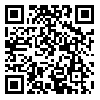BibTeX | RIS | EndNote | Medlars | ProCite | Reference Manager | RefWorks
Send citation to:
URL: http://jdisabilstud.org/article-1-759-en.html
Background & Objective: Proper nutrition is essential for the survival of newborn babies and child growth. Now-a-days with regard to the advancement of medical care, we encounter a growing number of at risk babies and correspondingly a growing number of children with swallowing and feeding disorders. Swallowing evaluation process has a long history. Typically, it is administered via imaging techniques. What makes this assessment method inadequate is that it cannot catch important environmental and behavioral factors affecting children during feeding. Specifying the safety of swallowing in children is not sufficient enough; oral sensory-motor skills and beyond it the parent-child relationship should also be considered. Behavioral scales of swallowing and eating assessment enable us to make much more observations needed for comprehensive assessments. Obviously, if we are to achieve effective treatment strategies in this area, the first step could be a comprehensive assessment of swallowing and eating in children. The present study aimed at finding validating an appropriate oral motor assessment scale of children.
Methods: Searching the various databases, we found systematic reviews in the field of non-instrumental evaluation of eating and swallowing in children. Among the measures introduced in these reviews, we chose the Schedule for Oral-Motor Assessment (SOMA) developed by Reilly et al (1995), which in our belief captured important factors such as being observational, encompassing all areas of swallowing and eating, covering a clear scoring system and having a cut-off point. The scale was translated into Persian according to the protocol of World Health Organization. Then a panel of experts including 5 speech and language pathologists holding a Ph.D. or speech therapy doctoral students compared the original text and the translated version and tried to resolve the drawbacks and ambiguities of the Persian scale items. The provided text was back translated into English. This version was compared to the original scale by the authors and revealed to be conceptually the same. Just a slight editing was done on the Persian scale according to the back translated scale. This pre-final version was then pre-tested on 10 dysphagic children. Observational intricacies were drawn from this pilot study, also some minor editions was done according to the findings. Finally, the scale was sent to 10 qualified speech and language pathologists in the area of swallowing for examining the applicability of the scale items.
Results: The Persian version of the schedule for oral-motor assessment with 65 items became ready for reliability assessment. All items proved to be assessable according to reviewers' opinions. Kendall's w test was calculated to evaluate the inter-rater reliability and revealed that the assessment results of ten experts did not differ (p=0.238, Kendall's w=0.112).
Conclusion: Regarding the implementation of the schedule for oral-motor assessment, it is noteworthy that this measure is quite executable in the clinical setting. The other point is that items of this scale are based solely on observation; evaluation and assessment should be done online i.e. the items should be scored while observing the eating behaviors. Sometimes it is needed that the child be exposed to an especial food texture such as biscuit (which has more items than other tissues) more than one time, to complete the assessment.
| Rights and permissions | |
 |
This work is licensed under a Creative Commons Attribution-NonCommercial 4.0 International License. |




